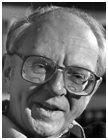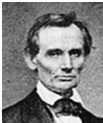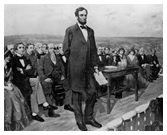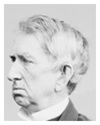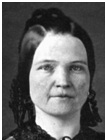|
 |
|
 |
Abraham Lincoln Leadership
Abraham Lincoln (1809-1865)
America’s greatest president (pictured right) who defeated the southern states in the American Civil War, and so ended slavery. His assassination prompted the admiring poet, Walt Whitman (pictured right below), to write: “Here, coffin, that slowly passes, I give you my sprig of lilac”.
For more detail see... The Battle of Gettysburg in the History Highlights section.
Why was he a great leader?
1. Vision He had a vision of a united, strong and ethical America, where everyone could prosper and live happily together.
2. Principle He courageously stuck to his principles of democracy, freedom and equality for all Americans, which is why he:
“Right makes might”, he said, i.e. leaders are more powerful and effective, if they do what’s right. Do something with more good than evil in it, he believed, because almost everything is a mixture of the two. “There are few things wholly evil or wholly good”, he said. 3. Determination and courage Inspired by intense ambition and a strong sense of duty, he overcame lots of failure and hardship before becoming president at the age of 60 including:
4. Passive pragmatism Lincoln strongly believed in fate i.e. events being determined by some Higher Force. This has been called his “Doctrine of Necessity”. He once said, “I claim not to
have controlled events, but confess plainly that events have controlled me”. According to his renowned biographer, David Herbert Donald (pictured right), this fatalism had vital consequences:
He had ideals, but to achieve them he changed his policies, if necessary. To gain the support of the slave states of Kentucky, Maryland and Missouri during the Civil War, he initially emphasized the aim of preserving the union rather than the abolition of slavery. He believed in slowly progressing towards his aims, avoiding bigotry and dogmatic inflexibility
5. Kind but tough He was kind and magnanimous to people (even his enemies), because he believed this was the best way to win them over. “With malice toward none, with charity to all”, he said in his Second Inaugural
Address after victory in the Civil War. He rarely lost his temper with people but, if he did, he apologized with a kind letter or gesture. But he could also be ruthless in pursuit of victory - for example:
He survived the Civil War, despite his nervous exhaustion - compare his photographs in 1860 (pictured right) and 1865 (below).
6. Trust, humility and consent People trusted and respected him, because of his
Lincoln:
He also believed that good government needs people’s consent.
7. Lifelong learner and thinker He was always striving to increase his knowledge through learning from:
8. Great communicator and motivator He made brilliant speeches that inspired people to do great things. His Gettysburg Address in 1863 (pictured right) is wonderful, because it was so clear and concise (only 272 words and three minutes long, after being re-written six times). It also encouraged people to achieve worthy ideals like “government of the people, by the people, for the people shall not perish from the earth”.
9. Consensus, change and creative decision making Lincoln:
He won people's respect by:
Lincoln said that “people who stay in the present will remain in the past”.
10. Family, friends and relaxation His Secretary of State, William Seward , and his wife,
Mary (pictured right above , particularly helped and supported him
in difficult times. He was also greatly influenced by his stepmother, Sarah (pictured right), who brought him up after the death of his mother, Nancy, in 1818. His great sense of humour also relaxed him.
11. Image conscious He made much of his poor upbringing and was the first president to use photographs to boost his image.
Key quotes on government and politics A house divided against itself cannot stand. I believe this government cannot endure, permanently half slave and half free. Government of the people by the people, for the people shall not perish from the earth.
Key quote on change The dogmas of the quiet past are inadequate for the stormy present and future.
Key quotes on ethics With malice toward none, with charity for all. You cannot escape the responsibility of tomorrow by avoiding it today. There are few things wholly evil or wholly good
Key quote on business ethics Care for both the man and the dollar; but in cases of conflict the man before the dollar.
Key quotes on leadership If you once forfeit the confidence of your fellow citizens, you can never regain their respect and esteem. It is true that you may fool all of the people some of the time; you can even fool some of the people all of the time; but you can't fool all of the people all of the time. My policy is to have no policy I claim not to have controlled events, but confess plainly that events have controlled me
Key quotes on influencing people Right is might I destroy my enemies when I make them my friends.
Key quote on love I do not like the man. I must get to know him better.
Key quotes on success and time management In the end it’s not the years in your life that count. It’s the life in your years. My great concern is not whether you have failed but whether you are content with your failure
Key quote on happiness Most folks are about as happy as they make up their minds to be.
Key quote on communication Better to remain silent and be thought a fool than to speak and remove doubt.
Key quote on religion When I do good, I feel good. When I do bad, I feel bad. That’s my religion.
Key quote on the past, present and future People who stay in the present will remain in the past |
|
|
||
|
|
|
||
|
||
| Copyright © wisdomtowin.com All Rights Reserved | ||
|





